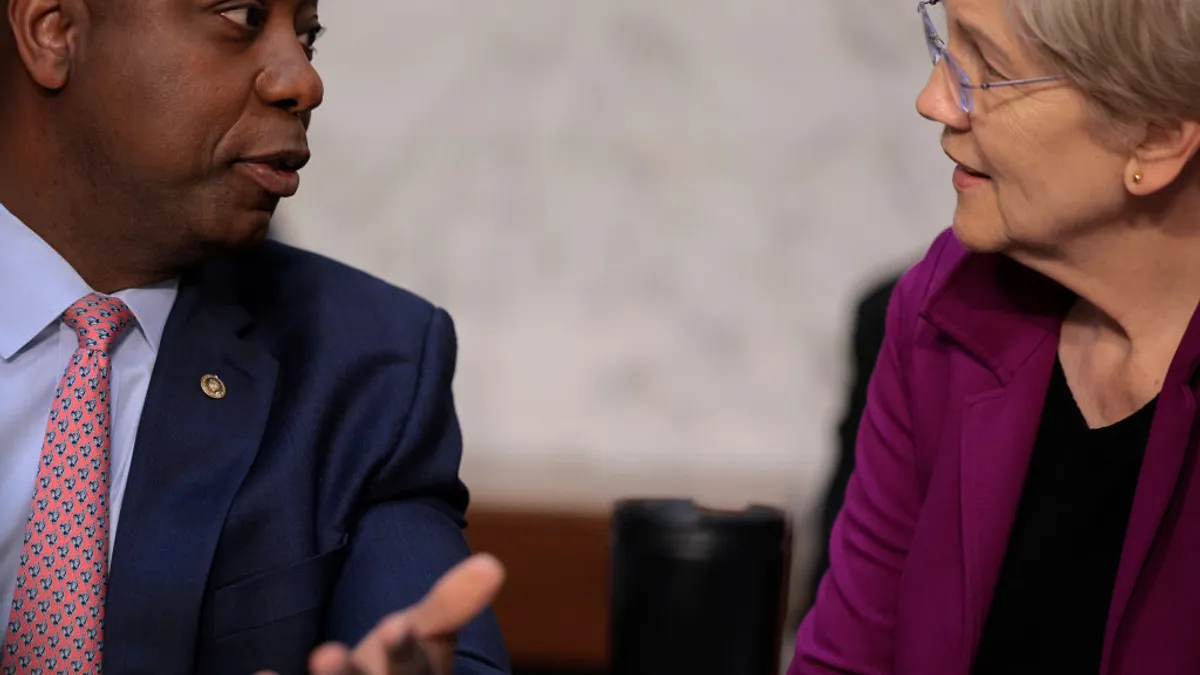Dive Brief:
- The Senate Banking Committee approved Jonathan Gould’s nomination to lead the Office of the Comptroller of the Currency, voting 13-11 along party lines Thursday.
- Gould “brings firsthand experience to the OCC” and “will put an end to politically motivated debanking and ensure financial institutions serve all credit-worthy Americans, not just those favored by Washington bureaucrats,” Tim Scott, R-SC, the committee’s chair, said during voting.
- Sen. Elizabeth Warren, D-MA, the committee’s ranking member, voted against Gould’s nomination, saying he “weakened the rules and helped undermine the safety and soundness of our national banking system as the OCC's Chief Counsel during the first Trump administration. His track record suggests that he will do what’s in the best interest of Wall Street, and the American people can pay it with the bailouts that follow.”
Dive Insight:
Gould’s nomination now goes to the full Senate, where it requires 50 or more votes for confirmation. If confirmed, he would replace Acting Comptroller Rodney Hood.
During a nomination hearing March 27, Gould pledged to “shine a spotlight” on any de-banking activities. His top priorities would include “depoliticizing the banking system,” improving supervision, embracing innovation and ensuring banks support the economy. De-banking has become a hot topic of late, after being mentioned by President Donald Trump on the international stage in January and bank executives and lawmakers since then.
Republican senators sought to ensure Gould is aligned with recent banking agency moves away from reputational risk, and Gould agreed with Hood’s decision to stop examining banks for reputational risk.
“I think too often reputation risk is used as a pre-text for other motives, and I think the regulators have at their disposal other forms of more easily quantifiable and just better understood, more precise, more objective terms, including litigation risk, [Bank Secrecy Act/anti-money laundering] compliance risk,” Gould said during the hearing.
Gould, a partner at law firm Jones Day, was nominated by Trump in February.
In a letter prior to last week’s nomination hearing, Warren asked Gould more than 100 questions, seeking to parse his thoughts on bank regulation, supervision, enforcement, merger reviews, cryptocurrency assets and regulatory independence, among other things.
Just before the committee’s vote Thursday, Warren indicated she wasn’t satisfied with Gould’s responses.
She linked the 2023 failures of First Republic, Silicon Valley Bank and Signature Bank to Gould’s deregulatory efforts during his previous stint at the OCC, but said he “flatly denied that loosening the guardrails on these big banks during the Trump administration played any role in the failures.”
“This deregulatory gaslighting raises serious alarm bells about his fitness for this key role regulating our financial system,” Warren said.
During his nomination hearing, when asked what needs to be done in the wake of the 2023 failures, Gould pointed to improving bank supervision.
“There seems to have just been a failure to focus on the material, financial risk embedded with that bank’s balance sheet and its unique business model,” Gould said, calling the oversight by the California regulator and the San Francisco Fed “deeply disturbing.”
Gould told Warren, in a response to her questions, he wants to ensure the OCC “does not suffer from similar deficiencies in its basic supervision. This includes ensuring that OCC supervision efforts are appropriately focused on material financial risks.”
The Senate committee also approved the nominations of Paul Atkins as chair of the Securities and Exchange Commission, and Luke Pettit for assistant secretary of the Treasury Department.
Also awaiting a vote with the full Senate is the nomination of Jonathan McKernan to lead the Consumer Financial Protection Bureau. The banking committee voted 13-11 along party lines March 6 to allow the former Federal Deposit Insurance Corp. board member to lead the CFPB.












